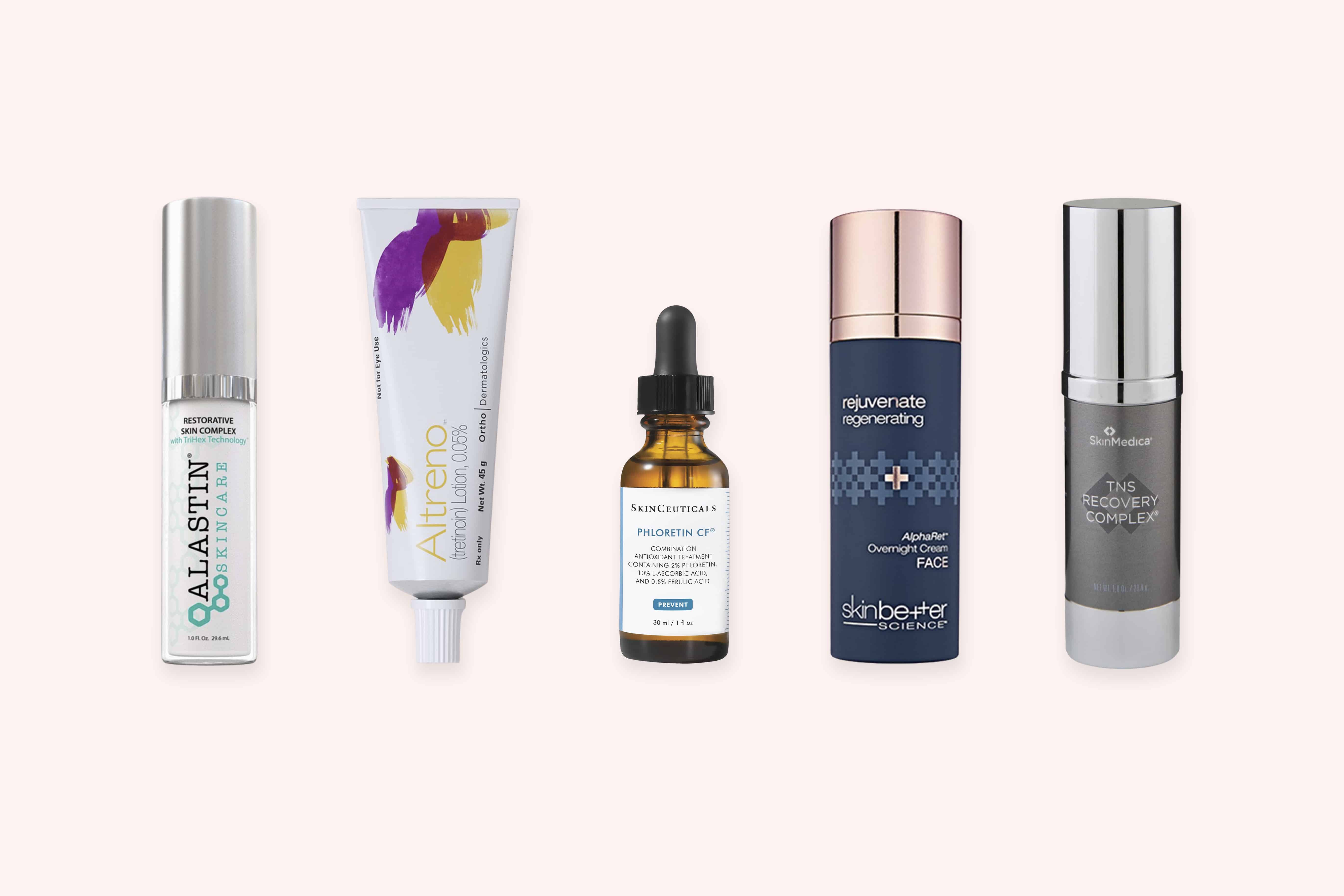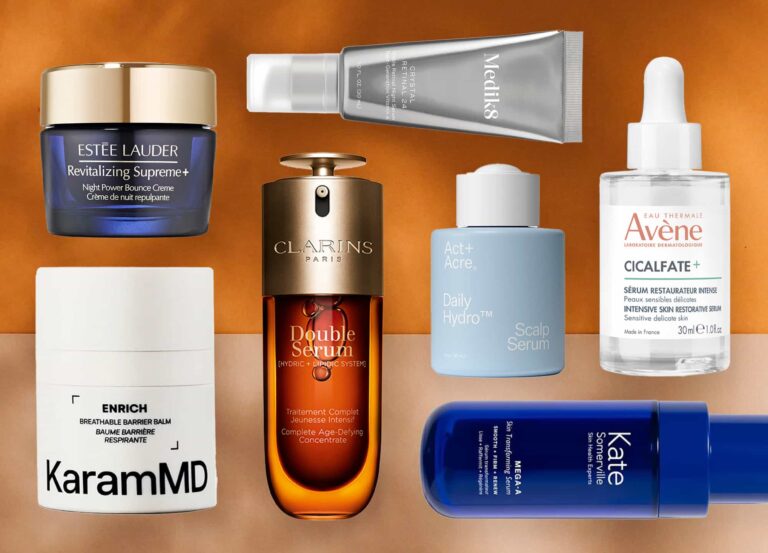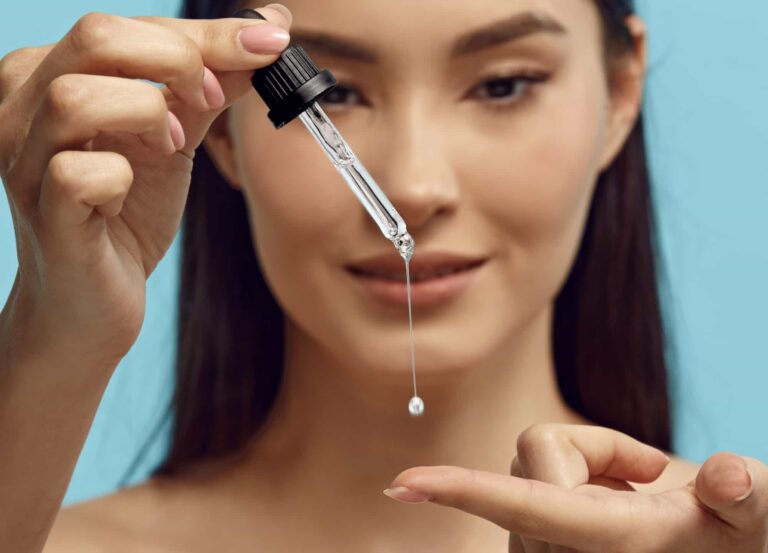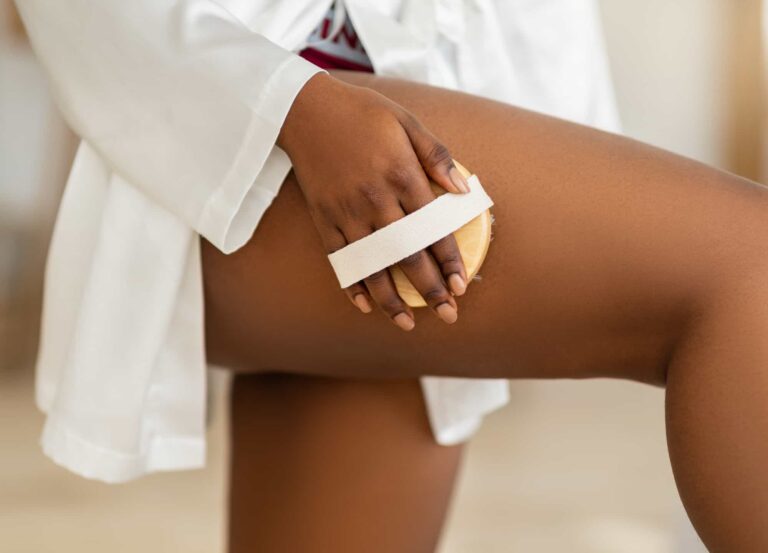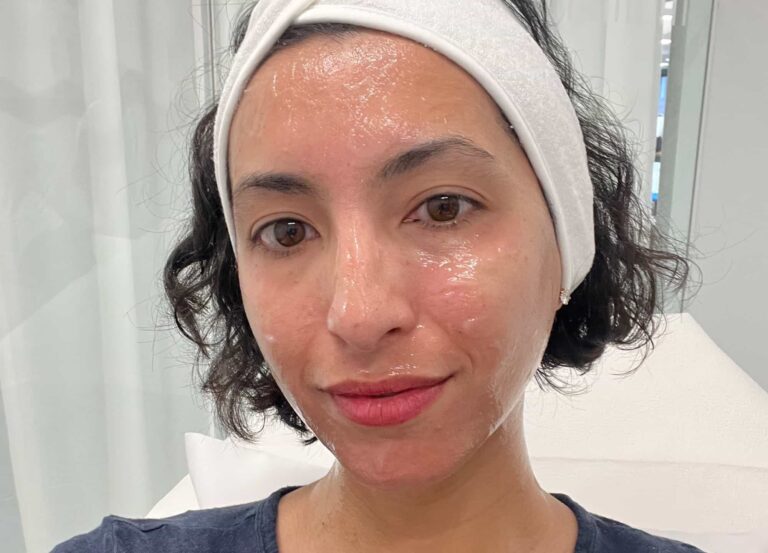Sunscreen is, without question, the most effective anti-ager on the planet. When pressed for proof, dermatologists and beauty editors often point to this 2016 study in the journal Dermatologic Surgery, which found that daily use of a broad-spectrum SPF over a one-year span not only prevents sun damage—mottling, dullness, fine lines—but can measurably reverse it as well, putting sunscreen in a very special league of its own.
While sunscreen is a nonnegotiable part of every skin pro’s regimen, the other players in their lineups can’t always claim the same degree of unanimous support. An ingredient’s efficacy may be challenged; its side effects, bemoaned. Even prescription retinoids, which have decades of rigorous studies and legions of derm fans backing them (as evidenced below), aren’t entirely across-the-board beloved, because certain skin types simply can’t tolerate them.
So beyond sunscreen, what do beauty’s most science-minded consumers count on to keep skin looking healthy and youthful? Here, the exact products top dermatologists credit with making the biggest improvement in their skin.
SkinBetter Science AlphaRet Overnight Cream ($125)
“It contains retinoic acid, which helps prevent blemishes and breakouts while gently exfoliating my skin, to maintain an even skin tone, and 10% glycolic acid, to help with the texture of my skin. The bonus is that both ingredients combined also improve the appearance of my pore size, fine lines, and wrinkles. It’s very hydrating, and they got the formula just right so that all skin types can tolerate it—absolutely no irritation, no redness, no dryness, no peeling, no flaking.” —Dr. DiAnne Davis, a board-certified dermatologist in Houston
Senté Dermal Repair Cream ($158)
“This has been a remarkable addition to my skin-care regimen. As a board-certified dermatologist with extremely fair, sensitive, dry yet acne-prone skin, moisturizing products have always been a struggle for me. This lightweight, nongreasy cream contains the powerful ingredient HSA, or heparan sulfate analog, that consistently leaves my skin well-hydrated and calm—never triggers acne breakouts—but noticeably fights fine lines and other superficial signs of aging.” —Dr. Jessica Weiser, a board-certified dermatologist in New York City
SkinMedica Retinol Complex 0.5 ($78)
“I believe retinols pack the biggest anti-aging punch—reducing pores and dark spots, taking off dead skin, boosting collagen production, making skin texture smooth and even. I started using them, as a teenager, for acne and kept up with them for their anti-aging benefits. This particular retinol formulation is mixed with hyaluronic acid, so my skin can tolerate it. I usually use it at least three times a week, at night. In the summer, when my skin seems to be more oily, I’ll use it up to five times a week. I like to add a hyaluronic acid serum on top, to seal it in and give my skin a little more hydration.” —Dr. Morgan Rabach, a board-certified dermatologist in New York City
Alastin Restorative Skin Complex ($195)
“There are many products that go into transforming my skin, but one that has made the biggest difference is Restorative Skin Complex. It contains tripeptides, which stimulate the production of elastin and collagen, to soften fine lines and wrinkles. It also contains L-ornithine, to plump and firm the skin, and antioxidants, to brighten the complexion.” —Dr. Arisa Ortiz, a board-certified dermatologist in San Diego
MGSkinLabs Vita-C Advanced Serum ($85)
“This vitamin C has helped my skin tremendously. I have very sensitive skin and need to use products that don’t irritate, like Retin-A or retinols can. I also have very fair skin and a tendency to get hyperpigmentation, redness, and melasma. This product brightens and lightens my skin, without irritation. I use it morning and night, and, of course, apply my sunblock right on top of it every morning.” —Dr. Michele Green, a board-certified dermatologist in New York City
Altreno (by prescription)
“Outside of sunscreen, the best data for anti-aging is with the use of topical retinoids. These vitamin A derivatives increase hyaluronic acid and elastin in the skin and increase cell turnover, thereby helping in the treatment and prevention of fine lines and wrinkles. I’ve tried all of them and found that the formulation really matters. I use Altreno, a prescription-strength retinoid, purely for anti-aging purposes and have noticed an improvement in the radiance of my skin as well as a more even skin tone. The active ingredient is still tretinoin 0.05%, but people [tend to] experience less dryness, peeling, and redness with this particular [lotion-based] formulation.” —Dr. Emma Taylor, a board-certified dermatologist in San Francisco
Related: 12 RealSelf Community Members Reveal Their Favorite Anti-Aging Product Under $100
Dr Dennis Gross Alpha Beta Universal Daily Pad ($150)
“These pads come as two sachets, joined together. The first one has both alpha and beta hydroxy acids in it. The primary alpha hydroxy acid is glycolic acid. Glycolic is small enough to penetrate the skin barrier and lift off dull, dead skin, to reveal fresh new skin underneath. Over time, glycolic acid has also been shown to promote the growth of collagen in the skin. The beta hydroxy acid, salicylic acid, helps to treat blackheads and decrease sebum production. Both of these also help to prime my skin to receive the retinol that’s present in the second sachet. Retinol is a vitamin A derivative and has been shown to do all the things. It evens out skin tone by increasing cell turnover and treats fine lines and wrinkling over time by building collagen. I rely on these whenever my skin looks dull or if I look especially tired. My skin is dry and sensitive, so I use these once a week, max. That’s often enough to get the results I’m looking for though.” —Dr. Papri Sarkar, a board-certified dermatologist in Boston
Alastin Skincare Renewal Retinol 0.5 ($60)
“The retinol in this formula is encapsulated by lipids, so it’s not too irritating. And it’s stabilized by the antioxidant activity of coenzyme Q10, so one bottle goes a long way. When I stick with my retinoid for a few weeks, moisturizing my way through the mild peelies, I notice radically improved texture and a more even skin tone, amounting to a literal glow. I kid you not. Those with light skin tones can also expect fewer fine lines; dark skin types don’t really get these.” —Dr. Mitalee Christman, a board-certified dermatologist in Boston
Skinbetter Science Alto Defense ($150)
“Total game changer in my morning routine! It provides one of the broadest ranges of antioxidants to protect skin DNA and brighten by blurring uneven pigment and redness. Its 19 powerful antioxidants guard against ultraviolet light, pollution, blue light from devices, and infrared heat. The formula also includes skin soothers and brighteners in a base of ceramides and fatty acids—key for skin moisturization. It’s like a supercharged protector that allows for DNA repair and prevents collagen and elastin fiber breakdown while also plumping my skin. I wear it whether I’m indoors or out, in front of a computer, or in any heated areas or situations.” —Dr. Amelia Hausauer, a board-certified dermatologist in Campbell, California
Tazorac .05% Cream (by prescription)
“This prescription retinoid is the gold standard for addressing oily skin and as an anti-aging, collagen-building product. The tazarotene retinoids bind the skin’s retinol receptors with the most affinity—meaning most tightly—to help with fine lines, reversing sun damage, and reducing pore appearance.” —Dr. Annie Chiu, a board-certified dermatologist in Redondo Beach, California
SkinCeuticals Phloretin CF ($166)
“Vitamin C is a wonderful antioxidant that protects us against free radicals and sun damage. It also helps with hyperpigmentation. A problem with a lot of vitamin C formulations is that they can make acne-prone people break out [due to the fairly standard inclusion of vitamin E]. This formulation does not contain vitamin E and is designed for people, such as myself, who are prone to acne. After using the product for four weeks, I noticed an improvement in fine lines and a reduction in hyperpigmentation. And it makes my skin glow.” —Dr. Nazanin Saedi, a board-certified dermatologist in Philadelphia
Retin-A Micro 0.06% (by Rx) and Juvive Retinol 100 ($185)
“I use a combination of prescription and nonprescription retinoids—one night [of] Rx, followed by one or two nights [of] retinol serum—to give a glow and prevent signs of aging. Retinoids also help with pores and pigmentation [issues]. Alternating these formulas helps to prevent dryness and irritation.” —Dr. Heidi Goodarzi, a board-certified dermatologist in Newport Beach, California
SkinMedica TNS Recovery Complex ($220)
“It has a complex of over 100 growth factors and cytokines that has been shown in studies to thicken both the dermis, or second layer of skin, and the outermost epidermis, resulting in an improvement of fine lines and wrinkles after as little as 60 days of daily use. My skin definitely looked more taut after using it for one month. It has no fragrances, it’s noncomedogenic and oil-free, and it doesn’t exacerbate breakouts. It goes well under moisturizers and makeup and doesn’t ball up, like many other serums. I travel with it wherever I go.” —Dr. Sabrina Fabi, a board-certified dermatologist in San Diego
Aklief and Epiduo Forte (both by prescription)
“I am religious with my prescription retinoids at night. I switch between Aklief and Epiduo Forte—powerful and efficacious retinoids for fighting off acne. They have changed my skin! Retinoids are the most used and most studied anti-aging compounds to reduce fine lines and wrinkles. They stimulate collagen production and the production of new [blood] vessels in the skin, which improves color. In addition, they offer the best defense possible against blackheads, whiteheads, and cysts while also improving the post-inflammatory hyperpigmentation that can be associated with acne.” —Dr. Sapna Palep, a board-certified dermatologist in New York City







